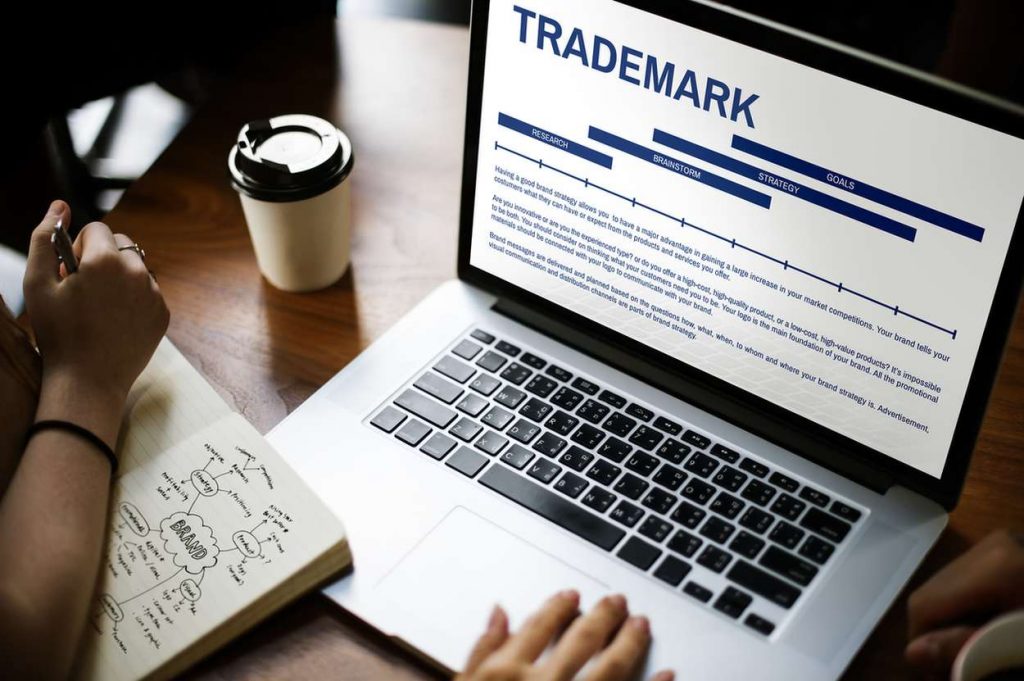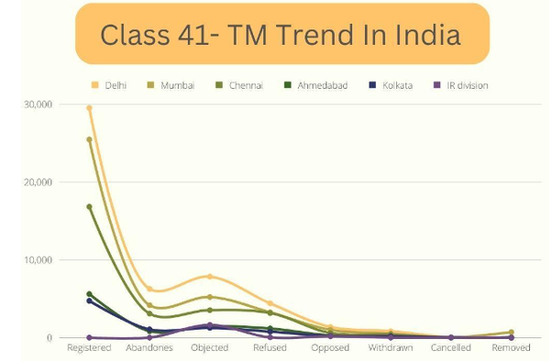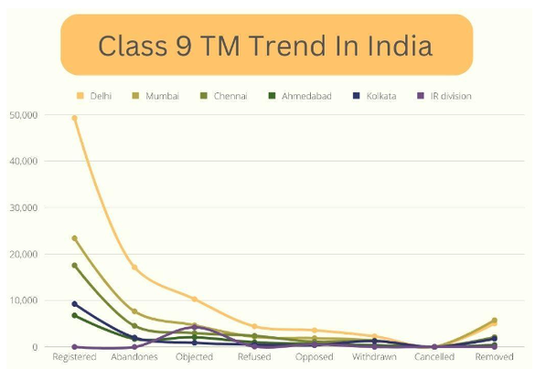
In 1957, the Nice International Classification System was established by the Nice Agreement for trademarks dividing the goods and services for registering a trademark. A new edition of the classification is published annually, but till 2013, it was published for five years.
The Nice Classification applies to all the Paris Union/Agreement signatories, signed in 1883.
In Nice Agreement in 1957, the trademarks were classified into 45 different classes. The classes are divided based on the industry. Still, if we see the trend of trademark registration since its implementation, five trademark classes have the lion’s share, which implies they are the most preferred.

We have created an analysis based on the five classes in each of the five IPO offices in India, which shows that Mumbai shows the highest rate of successful registrations, whereas Delhi shows the least. It is important to note that Delhi receives the highest number of trademark applications, making it a neck-to-neck competition for each applicant.
Registration of trademarks is now essential, and with the rising number of applications, it has become a bit critical too. Conducting a proper trademark search became an integral part of the registration process.
In this article, we shall discuss the five most popular trademark classes in India and the trend of each IPO office dealing with them.
What are the five most popular trademarks in India?
The five most popular trademarks in India are
- Trademark Class 41.
This includes education and entertainment services. You would choose Trademark Class 41 if you registered services related to:
- Services for training animals or educating people in all their forms. Services for training, athletic competition, and cultural events are referred to here.
- displaying literary or artistic works to the public to educate or entertain them
- Services mainly aim to amuse, entertain, or provide for human consumption.
The graph below shows the trend of class 41 trademark filings in each of the five IPO offices all over India; Delhi has the highest number of filings, whereas Kolkata records the lowest.

- Class 5
Products such as pharmaceutical and veterinary preparations, sanitary preparations for medical use, dietetic food and substances adapted for medical or veterinary use, food for babies, dietary supplements for people and animals, plasters, materials for dressings, material for stopping teeth, dental wax, disinfectants, preparations for destroying vermin, fungicides, herbicides, etc. are all included in trademark Class 5.
The graph below represents the success and failure rate of class 5 trademark files in each of the IPO offices in India.

- Class 9
People, businesses, and industries worldwide refer to the Nice classification class 9 as the “trademark class 9,” particularly concerning registering their respective trademarks for the goods and products in this class. To choose the appropriate classes for the international and national registration of trademarks and service marks, this class 9 of the Nice classification is used as the foundation. - Our trademark attorneys of the highest calibre and internationally recognised in India and other countries have diligently and skillfully represented this class 9 trademark. They have provided these services to all five of India’s regional trademark registry offices, and they have so far complied with nearly all of the international treaties relating to trademarks in connection with registering trademarks for various classes under this helpful classification. The Madrid Protocol, the TRIPS Agreement, the Berne or Paris Convention, and the Community Trademark of the European Union are a few of the international agreements and conventions mentioned.
- Class 25 of trademarks is significant concerning the trademark registrations associated with these objects and items on a global scale. The NICE classification, based on an internationally and globally recognised classification of goods and services, determines which classes to assign to the trademarks and service marks used in different economic sectors. The WIPO updates this classification every five years to reflect changes made during the interim.

- Class 25
Class 25 of trademarks is significant concerning the trademark registrations associated with these objects and items on a global scale. The NICE classification, based on an internationally and globally recognised classification of goods and services, determines which classes to assign to the trademarks and service marks used in different economic sectors. The WIPO updates this classification every five years to reflect changes made during the interim.
The graph here shows that the Delhi IPO office has shown the highest trademark registration in class 25, and proportionately, the objection raised against the applications filed in the Ahmedabad IPO office is higher.
- Class 35
The first class in the Nice classification specifically related to the service sector is the service mark class 35. Services in marketing, operations management, and business administration fall under this class. As a result, class 35 of service marks is where the service marks used as the source identifiers for these services are registered globally. This page provides beneficial information about the Indian and international registrations of all service marks falling under Nice Class 35 with our efficient and knowledgeable legal services.
Class 35 generally covers most of the trending industries in India. Therefore, there has been an increase in the filing of the same; the graph here shows the tough competition among the brands to secure a unique name for their business.
What are the ways to increase the chances of trademark registration?
A trademark search is necessary before adopting a mark; it determines whether the proposed mark is available and protectable. By searching for existing trademarks, you can avoid the pricey repercussions of a trademark infringement lawsuit, product redesign, and rebranding. When it comes to obtaining trademark clearance, there are many different places to look. The USPTO, WIPO, EUIPO, and other organisations have searchable databases where users can look for words, brands, and images registered as trademarks. In addition, parties can look up information using domain names, phone book listings, newspaper listings, and internet searches.